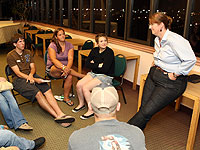FALL 2018 HUHC SEMINARS
HUHC 20I (H1) READING AND WRITING ABOUT CLIMATE CHANGE AND OTHER 'HOT' TOPICS IN ENVIRONMENTAL SCIENCE
Professor Jase Bernhardt, Geology
TR 9:35-11:00AM
CRN: 95834
DVSN 102
In an era featuring increasing concern for the environment, but at the same time, an increase in partisanship, how do we consume, interpret, and communicate information about topics such as climate change and sustainability? Throughout this seminar, we will learn how to analyze scientific writing in the mainstream media, academic journals, and governmental reports. Students will have the opportunity to select articles of interest, prepare critiques, and lead group paper discussions. In addition to reading and critiquing the work of others, students will learn how to write about science for both technical and broader audiences. Enhancing these reading and writing assignments will be background lectures demonstrating, at an introductory level, how the various Earth systems operate, how we as humans influence them, and how we can limit our impacts in a just and efficient manner. Field trips off campus to the Hempstead Plains and an Escape Room experience will complement in-class activities and create opportunities for students to get to know one another.
(The Director of Sustainability Studies has indicated this course may be counted as a Sustainability elective toward the completion of the requirements for majors or minors.)
HUHC 20D (H1) WATER, WATER, EVERYWHERE
Provost Gail Simmons, Biology
MW 4:30-5:55PM
CRN: 92052
BARND 102
"Water, Water Everywhere" is an interdisciplinary exploration of the most curious and pervasive substance in the universe – water. We will explore several "big ideas" about water: the ubiquity, pervasiveness and anomaly of water in the universe and on our planet; and humanity's relationship to and agency over water -- its power, its limits, its necessity for our survival as a species. We'll delve, at a basic level, into the science of how water is put together — the role of water in the human body, our planet, and the universe; the economics, politics, and sociology of water; and water's power as a metaphor, religious symbol, and theme in literature. Individual students will write a mid-term paper that explores some aspect of water that matches their interest. Students will then work in teams that bring together diverse majors and interests to produce a final research-based multimedia project that tells a compelling story about water.
HUHC 20G (H1) MASS COMMUNICATION AND SOCIAL MOVEMENTS IN LATIN AMERICA
Professor Mario Murillo, Radio, Television, and Film (RTVF)
TR 2:20-3:45 PM
CRN 93059
DAVSN 102
This course examines how social movements in Latin America have deployed mass communication as a tool of their grassroots mobilizing efforts across the continent. Using historical and contemporary case studies in the region, students will be introduced to the variety of strategies that have been applied by Indigenous, peasant, Afro-descendant, student and women's organizations to contest the political, social and economic status quo in their respective countries. From Bolivian Miner's Radio in the 1940s to the Zapatista National Liberation Front in Mexico in the 1990s, from community-published newspapers, to contemporary social media campaigns, we will critically assess the successes and the challenges of constructing a bottom-up counter-narrative to the mainstream, establishment media system in Latin America.
The class will have a combination lecture and seminar format, with students expected to participate actively in discussions of readings, extensive video/film presentations, guest lectures, as well as unfolding issues making news in the region.
(The chair of the RTVF department has indicated this course may be counted as an RTVF elective toward the completion of the requirements for majors or minors.)
HUHC 20C (H1) JUSTICE FOR ALL: AN AMERICAN REALITY OR ILLUSION?
Judge Fern Fisher, Law School
TR 2:20-3:45PM
CRN: 92049
DVSN 014
Through an exploration of past and recent court decisions, historical and sociological materials, we aim in this class to discern whether race, ethnicity, national origin, gender and poverty provide barriers to obtaining justice in the United States. Students will also observe a court or administrative proceeding and be challenged at the end of the semester to provide suggestions for changes they identify as necessary in the American justice system.
(The chair of the Sociology department has indicated this course may be counted as a departmental elective toward the completion of the requirements for the Criminology major or minor.)
HUHC 20E (H1) BITTER/SWEET: BRITISH LITERATURE, CONSUMER CULTURE, GLOBAL CONTEXTS
Professor Irene Fizer
MW 4:30-5:55PM
CRN: 92053
BROWR 102
This course traces the emergence of modern concepts of consumption through selected works of British literature that span the eighteenth, nineteenth, and twentieth centuries. We will look at literary texts--such as Jane Austen's Mansfield Park, Emily Bronte's Wuthering Heights, Lewis Carroll's Alice's Adventures in Wonderland, George Orwell's 1984, Jean Rhys' "The Day They Burned the Books," and Christina Rossetti's "Goblin Market"--through an interdisciplinary lens, and in relation to contemporary works of cultural criticism, such as Stanley Mintz's Sweetness and Power: The Place of Sugar in Modern History, Bee Wilson's Consider the Fork, and Wolfgang Schivelbusch's Tastes of Paradise: A Social History of Spices, Stimulants, and Intoxicants. Beginning in the late 1600s, new products, including coffee from Arabia, tea from China, and sugar from the Caribbean, began to flow into English ports. In the wake of the institutionalization of the trans-Atlantic slave trade, and the expansion of the British Empire's overseas territories, English writers began to consider how global trade was at once creating a seemingly insatiable consumer demand for imported commodities, and giving rise to new arenas of social interaction, such as coffeehouses, tea shops, and urban pleasure gardens. At the same time, many of the commodities upon which the English were now dependent were being produced by men, women, and children who were either enslaved or exploited for their labor. As the literary texts in this course juxtapose the worlds of the imperial capital and the colony, they foreground questions relating to broader issues of the free market, economic injustice, racial division, and gender.
(The chair of the English department has indicated this course may be counted as an English/Creative Writing elective toward the completion of the requirements for majors or minors.)
HUHC 020F (H1) SUFISM: ISLAMIC MYSTICISM OR A FORM OF SOCIAL NETWORK?
Professor Elyor Karimov, Fine Arts, Art History and Design
TR 4:30-5:55PM
CRN: 92051
DAVS 0014
Sufism is best known as the Islamic Mysticism. This, however, is only a part of the story. In fact, Sufism emerged as a social phenomenon parallel to the mainstream Islam by the 11th century CE and by the 14th century started assuming the role of the state ideology in all major non-Arab regions of Islamic world. As social networks, Sufi brotherhoods (orders) have been responsible for Islamic missionary activity from Asia (China and India) to Africa and to Europe's Balkan Peninsula. In the last several centuries Sufism served as the middle class Ideology and the source of inspiration for Persian, Turkic and Indian literature. Poetry brought Sufi philosophical and spiritual ideas beyond Muslim world deeply affecting European and American culture. For centuries Sufism provided social and political stability. Unfortunately, beginning with the 20th century Salafi ideologies started seeing local Sufi Islam as its principle foe and now are waging a major war on Sufism. Yet, in many places Sufi tolerance still serves as alternative to Islamic fundamentalism. This course will examine both the history of Sufism and its place in contemporary religious and political discourses.
HUHC 20B (HA) CABINET OF CURIOUSITIES
Professor Sophie Hawkins, Religion
TR 4:30-5:55PM
CRN: 91107
LIBRARY 245
This seminar takes its inspiration from 17th century cabinets of curiosities or wunderkammern (wonder rooms). These were collections of the exotic and the bizarre, including both natural specimens and cultural artefacts brought back from distant lands. Whilst these cabinets served to prove the collector's social status, they were also invitations to think. Objects were grouped in fluid taxonomies rather than rigid hierarchies, and viewers were invited to marvel at the wonders of the world.
In this seminar, we will seek to create our own cabinet of curiosities—each object to be selected by an individual student but researched collaboratively by us all. Hence there will be no predetermined curriculum for the seminar; rather, the areas of research will be determined by student's own intellectual and cross-disciplinary interests.
(The chair of the Religion department has indicated this course may be counted as a Religion elective toward the completion of the requirements for majors or minors.)
HUHC 20J (H1) THIS IS YOUR BRAIN ON POLITICS: MANIFESTATIONS AND APPLICATIONS IN POLITICAL PSYCHOLOGY
Professor David Green, Political Science
MW 2:55-4:20PM
CRN: 94569
BARND 102
The standard model for explaining political behavior is Enlightenment rationalism, updated by the rational-choice model prevalent in the social sciences. However, both contemporary political events and new brain-scanning technology increasingly remind us of how incomplete that approach is. Enter the discipline of political psychology. In this course, which surveys the prominent applications and manifestations of this new approach to explaining political behavior, we'll examine the political psychology of identity, ideology, racism/intolerance, voting behavior, leadership, international conflict and cooperation, terrorism, decision-making, social movements and more.
(The chair of the Political Science department has indicated this course may be counted as a Political Science elective toward the completion of the requirements for majors or minors.)
HUHC 021A (H1) DEVELOPING A NEW PRODUCT OR SERVICE
Professor Boonghee Yoo
TR 11:10 12:35
CRN: 96241
GALW 013
A business requires three steps to develop and launch a new product or service successfully: Market Segmentation (Identify and profile distinct groups of buyers who differ in their needs and preferences), Market Targeting (Select one or more attractive and fitting market segments to enter), and Product Positioning (For each target segment, design a right quality product and change customer beliefs and attitudes). The objective of the course is to help students to learn those concepts in depth and develop necessary skills to implement the concepts to real business situations for innovative products/services. The course will consist of lectures, journal article discussions, a new product design, and consumer data collection and analysis.



